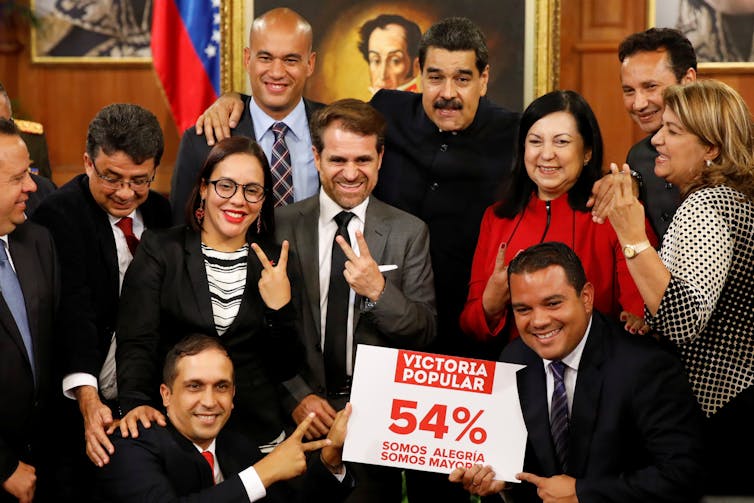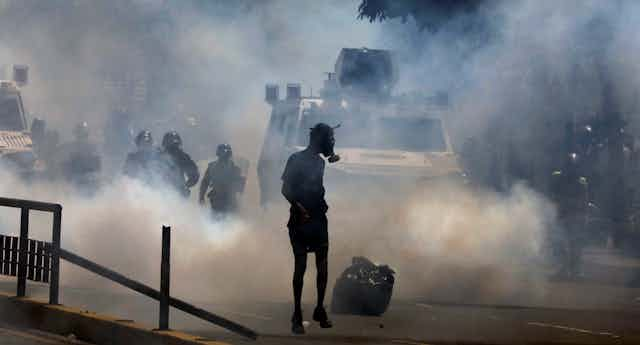It’s been a bittersweet couple of weeks for the Venezuelan opposition, which for six months this year staged daily protests against the authoritarian-leaning regime of president Nicolás Maduro.
On Oct. 26, the alliance – which began working together in 2008 to counterbalance Hugo Chávez’s “Chavista” regime – was given the Sakharov Prize, one of the world’s most prestigious human rights awards.
“Today we are supporting a nation’s freedom to struggle,” said Antonio Tajani, president of European Parliament, in bestowing the honor upon the more than two dozen parties that comprise Venezuela’s Democratic Unity Roundtable.
However, the award came just after the opposition had been handed a stunning defeat in Venezuela’s Oct. 15 regional elections. Despite a 75 percent approval rating, its candidates won just five of 23 state governorships.
Today, President Maduro has consolidated his power, Venezuela – my home country – remains hungry and mired in crisis and the resistance movement is flagging. Is this the beginning of the end of the Venezuelan opposition?

Dropping the ball
Internationally, things are going well for the opposition. Support has been growing since it initiated daily protests against the Maduro government in January 2017. Demonstrations – some of them the largest in Venezuela’s history – took place every day in all major cities for over six months.
Maduro countered with an iron fist. More than 120 people were killed and hundreds were arrested. The repression drew condemnation both at home and abroad, and for the first time in 18 years of Chavista rule in Venezuela, the international community took action.
The U.S. and Canada passed sanctions against key Venezuelan officials, and Maduro was rebuked by both the Organization of American States and the EU.
Under pressure, the president became ever more authoritarian, creating an all-powerful “Constituent Assembly” that effectively nullifies Venezuela’s opposition-led National Assembly. The European Parliament denounced this unconstitutional move in its presentation of the Sakharov human rights prize, expressing its “full support for the National Assembly of Venezuela, the only democratically elected parliament.”
Unraveling at the seams
Back home, though, things are looking far grimmer.
The opposition coalition – comprised of left, center-left and center-right parties – has always been a fractious and delicate alliance. Its anchor is the Democratic Action Party, which together with the Social Christian Party dominated Venezuelan politics from 1959 until 1999, when Chávez was first elected.
Many analysts were surprised when most of the parties in this opposition coalition agreed to participate in the Oct. 15 gubernatorial elections. The vote, long delayed by the Maduro regime, had been postponed since December.
But both the opposition and the U.S. State Department believed that bias in the regime-dominated electoral body would make free and fair elections impossible. Most supporters of the resistance movement thus expected the opposition to send a message by boycotting this fraudulent exercise.
Plus, fully 7 million Venezuelans had just voted, in an unofficial July referendum held by the opposition, to reject Maduro’s Constituent Assembly. By participating in the regime’s gubernatorial elections anyway, opposition leaders essentially ignored the voice of their base.
The decision to go to the polls under these circumstances turned out to be a costly misstep. As soon as the opposition announced its intention to run candidates in the race, the massive protests that had cornered the government came to a halt. Then, on Oct. 15, the opposition was badly defeated in an election with clear irregularities.
A big win for Maduro
Thus, even with an approval rating of 23 percent – down from 54 percent when he took office in 2013 – Maduro’s government managed to take over a majority of state governments.
Several days later, the foreign ministers of 10 Latin American countries – among them Argentina, Brazil, Colombia, Chile and Mexico – refused to recognize the election results, acknowledging “various obstacles, acts of intimidation, manipulation and irregularities.”
That didn’t stop the Maduro regime. It used the elections to legitimize its unconstitutional Constituent Assembly, ordering that all elected governors be sworn in before it.
After initial protest, four out of the five newly elected opposition governors ultimately agreed to be inaugurated before the assembly. Only Juan Pablo Guanipa, the governor-elect of Zulia – the richest state in the nation – refused. Maduro’s government has announced it will hold a new state election there in December.
As photos of the inauguration ceremony circulated in the media last week, Venezuela’s most prominent caricaturist, Rayma Suprani, captured the national sentiment. She tweeted an image of a Venezuelan throwing up.
A disenchanted nation
Beyond contesting October’s election results at the United Nations, it’s unclear what Venezuela’s opposition can do at this point. The group is now fighting over whether to boycott December’s municipal elections.
Henry Ramos Allup, leader of the Democratic Action party, has been accused of betraying the rest of the opposition. All of the four governors sworn in before Maduro’s Constituent Assembly were from his party, and none has convincingly explained why they cooperated with the regime, arguing simply that they had to honor the mandate handed to them by voters.
Several prominent political figures – including Henrique Capriles Radonski, the outspoken opposition leader who ran against both Chávez and Maduro in Venezuela’s last two presidential elections – have now said they’ll abandon the electoral coalition.
And if that’s not a sign of the imminent collapse of Venezuela’s opposition, I don’t know what is.

